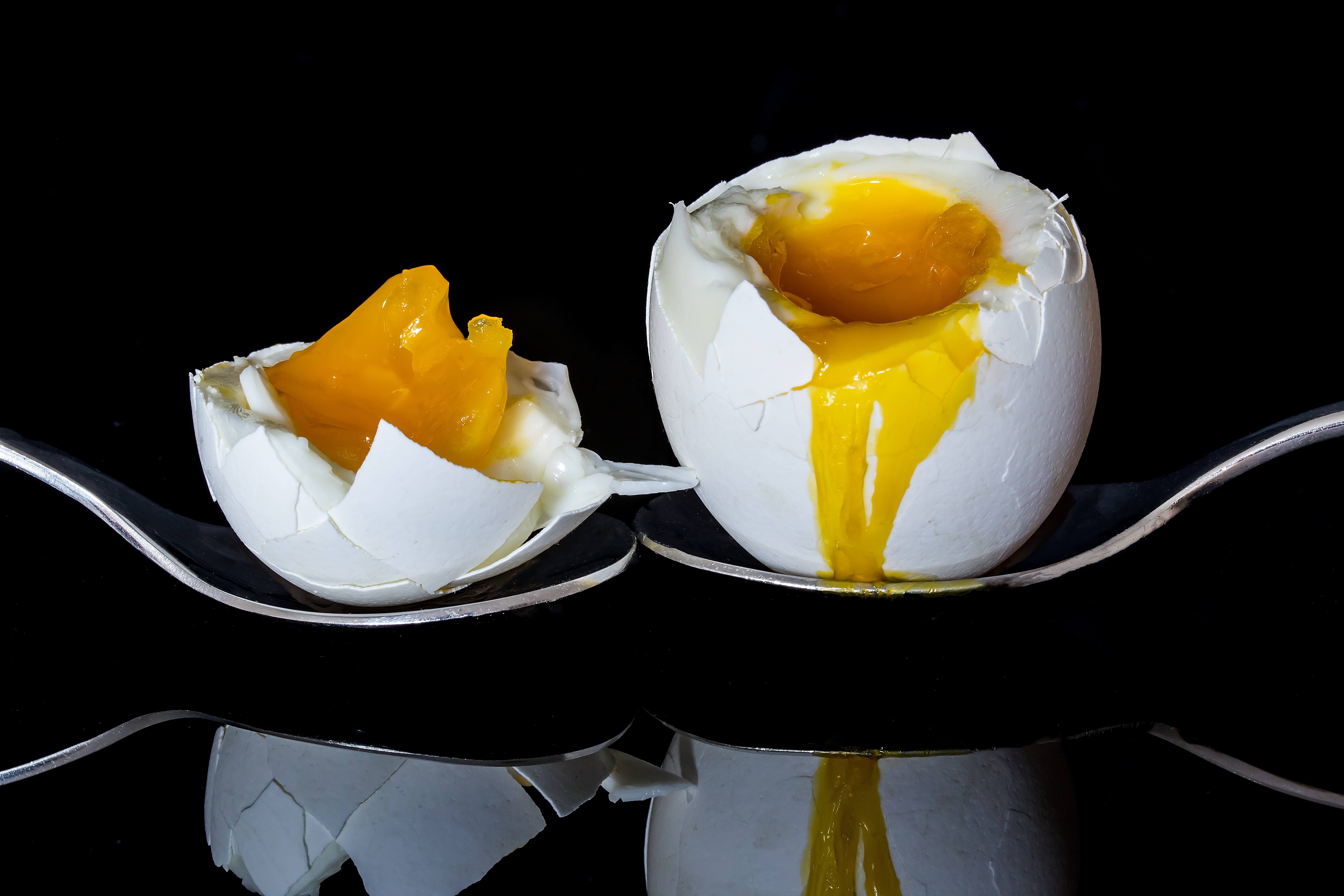
Two decades ago, during the opening stages of my own health journey, I’d often buy 10 dozen or so eggs at a time. Not only are eggs a cheap and highly bioavailable source of lean tissue building protein, but having to toss out half the egg (the yolk) due to dietary cholesterol and fat concerns meant I was going to have to eat a lot of them. With further scientific research, the fear of the delicious and nutritiously-dense egg yolk has subsided, and the latest issue of The American Journal of Clinical Nutrition provides more empirical data about why you should walk right past those cardboard cartons of plain egg whites: GAINS.
Before we get into the yellow heart of the research, let’s take a closer look at what my daughter fondly refers to as “the yummy part” of her breakfast. The egg white contains some very valuable egg albumin protein, but by weight is actually nearly 90% water and contains almost nothing else in the form of micronutrients. The yolk, on the other hand, is densely nutritious, rich in vitamins A, B12, D, E, and K, antioxidants lutein and zeaxanthin, folate, choline (vitamin B4), and one thing almost all adults could benefit from getting more of in their diet: omega-3 fatty acids. At this point, there is little validated reason to exclude egg yolks from the diet; in fact, the single most conservative governing body on the planet, the U.S. Department of Agriculture, who develops the dietary guidelines for Americans, has officially scrubbed its hands of any suggestion that there is a connection between dietary cholesterol and blood cholesterol, and it now includes whole eggs among it suggested sources of protein. Unless you are very closely monitoring your caloric intake, there is simply no reason to make your next omelet sans yolks (and even that reason may be moot) . And if you are, please contact me, as I know a five-year-old girl who would love to take them off your hands.
In this most recent study, researchers from the University of Illinois and University of Toronto collaborated to investigate the influence of consumption of egg whites and whole eggs on exercise recovery and muscle protein metabolic responses. The primary target was examining the impact on protein synthesis, the biological process by which cells generate new proteins, which is widely accepted as one of the primary factors in strength gains and muscular hypertrophy. In the 10-participant cross-over trial (where each study group receives both treatments so that individual responses may be compared), blood and muscle biopsy samples were taken after planned training sessions and post-workout consumption of either 3 whole eggs (18g protein, 17g fat) or 3 egg whites (18g protein, 0g fat). The eggs were specifically developed with isotopically labeled leucine (an amino acid which is known to be directly associated with protein synthesis) so that researchers could track where the food-derived amino acids ended up after consumption. Tracking the labeled eggs, there was little measurable difference in the time rate of digestive processing and the amount of plasma levels of leucine and other dietary amino acids, but there was a significant difference in the myofibrillar protein synthesis response. Significant as in a 43% advantage within that very important anabolic window. While these findings do suggest that whole eggs may facilitate more effective muscular recovery and increased gains in size and strength, it is still unclear how, as previous research has shown that simply adding dietary fat to isolated protein has little effect on post-workout response. The most logical hypothesis is micronutrient content, specifically the high concentration of choline (often referred to as vitamin B4) present in egg yolks, as choline supplementation has been shown to be linked to increases in anabolic hormone response to weight training and strength gains. But it is impossible to know without further research, and the isolation of specific nutrients often has totally different biological effect than a whole food as whole food and nutrient synergy is a topic only beginning to be explored by nutritional science.
The one consistent takeaway from the latest contemporary nutritional science research (and in reality, all nutritional science research is contemporary) is that the whole food is virtually always superior to the sum of its parts. When evaluating whole foods, there are very rarely circumstances where isolating specific components results in better outcomes, and this appears to remain the case when talking eggs (and gains). Don’t argue with Rocky or Gaston, whether you are cracking them into a blender or consuming them by the (5) dozen, the (whole) egg is one of the best muscle-building foods we know of.
 Dr. Damian Rodriguez is the health and exercise scientist for doTERRA International, LLC. He holds a doctorate in health science, a master’s degree in exercise physiology, and countless professional certifications. He has spent most of his life researching nutrition, exercise, and the lifestyle behaviors associated with optimal health. Along with his passion for health, as someone who lives with Asperger’s Syndrome, he is also involved in bringing awareness to autism spectrum disorders. There are varying opinions about many health and fitness topics. His opinions are his own and not necessarily that of doTERRA International, LLC. Consult your healthcare provider before making any changes to diet and exercise.
Dr. Damian Rodriguez is the health and exercise scientist for doTERRA International, LLC. He holds a doctorate in health science, a master’s degree in exercise physiology, and countless professional certifications. He has spent most of his life researching nutrition, exercise, and the lifestyle behaviors associated with optimal health. Along with his passion for health, as someone who lives with Asperger’s Syndrome, he is also involved in bringing awareness to autism spectrum disorders. There are varying opinions about many health and fitness topics. His opinions are his own and not necessarily that of doTERRA International, LLC. Consult your healthcare provider before making any changes to diet and exercise.
